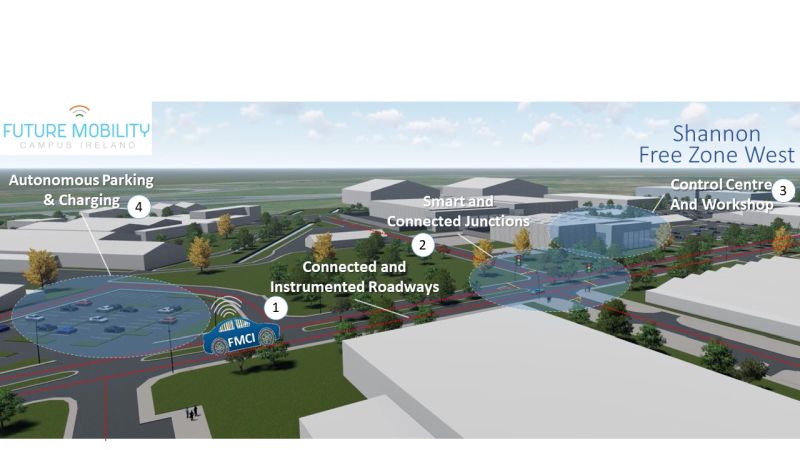
Shannon’s Pedigree as a Centre for Innovation to be manifested yet again in Creation of a Future Mobility Campus at Shannon Free Zone
Since its establishment in the early 1960s, the Shannon Free Zone has gained global recognition for being instrumental in delivering many innovations, from the world’s first duty free zone, the birthplace of aviation leasing, and the spawning of a dynamic sub-supply base to respond to the needs of Ireland’s first influx of foreign direct investment. However, as befitting a new decade, the next innovative offering from Shannon, outlined at a Shannon Chamber webinar, will take Shannon to yet more new heights, this time in the future mobility space.
The decision to establish a Future Mobility Campus in Shannon was born out of a realisation that Ireland needs to derive the economic benefits arising from the global opportunity that connected and autonomous vehicles offer and the fact that many countries have already established testbeds.
Partners in the new venture, which will be known as Future Mobility Campus Ireland (FMCI), led by Jaguar Land Rover Shannon’s Vehicle as a Service (VaaS) manager, Russell Vickers, include Ireland’s leading automotive and technology organisations across small and medium-sized enterprises (SMEs), multinational companies (MNCs), Research Institutions and Institutes of Technology with support from local authorities, state agencies, and Chambers of Commerce, including Shannon Chamber.
The large audience who logged in to the Webinar heard about the ambitious plans to create and deliver future mobility testbed facilities at Shannon Free Zone. This testbed will stimulate research, development and innovation in the area of autonomous connected electric shared vehicles (ACES), including connected and autonomous vehicles (CAV) in Ireland. It will benefit development and innovation not only for the automotive industry but also for a range of other industries including telecommunications, computing, and artificial intelligence.
As Russell Vickers explained: “The project aims to deliver a CAV test facility located in real-world settings, providing technology companies and researchers with an ability to test and enhance their innovations.
“The test facility at Shannon Free Zone will consist of a road network that is retrofitted with interconnected state-of-the-art sensing and telecommunication technologies. We will be installing smart and connected junctions on the Zone, have a workshop and control centre, and install an autonomous parking and charging area.
“This facility will be made available to a wide range of customer sets including national and international automotive and technology providers that are interested in testing their innovations in real-world settings before the product release phase. This investment has been identified by industry as pivotal to raising national competitiveness in transport and mobility,” he added.
Commenting on the feedback from the webinar, Shannon Chamber CEO Helen Downes: “Having already been introduced to this exciting concept at a Chamber board meeting, we felt it was imperative to let a wider audience hear about the plans that are underway to build and operate the first testbed for connected and autonomous vehicles in Ireland. Shannon was the first duty-free zone in the world so it is very fitting that it should, once again, be an area for delivering technologies for the future.
“When you consider that the world market for CAV technologies is estimated to be worth circa €70bn by 2035 and that this does not include the ancillary electric and mobility services, growth markets in their own right, Shannon is set to play a major role in the development of these sectors, most particularly as a testbed for many breakthrough technologies before they are released to the market.
“Shannon Free Zone’s road system, the innovation that is already here and the great collaboration that exists between players in all sectors, position Shannon as the perfect testbed location. It’s a very exciting project and one which we, as a Chamber, are delighted to be associated with,” added Ms Downes.

